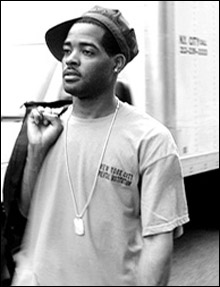Write me some goddamn legislation, he thundered. All anybody up in Boston is talking about is Len Bias. The papers are screaming for blood. We need to get out front on this now. This week. Today. The Republicans beat us to it in 1984 and I don’t want that to happen again.
That’s House Speaker Tip O’Neill, less than a month after Bias’s death, paraphrased by writer Dan Baum in his book Smoke and Mirrors: The War on Drugs and the Politics of Failure (Back Bay Books). O’Neill intuited that the shock and anger felt by his constituents could be channeled to help reverse the image of Democrats being soft on crime.
“In life, Len Bias was a terrific basketball player,” Baum writes. “In death, he became the Archduke Ferdinand of the Total War on Drugs. What came before had been only skirmishing; the real Drug War had yet to begin. Within weeks, the country would be marching, bayonets fixed.”

DEVASTATED: Filmmaker Kirk Fraser (above) says his Without Bias — premiering Tuesday as part of ESPN’s “30 for 30” series — looks at how Bias’s death had an effect on and off the court. |
Star crossedLike me, Fraser was also 10 when Bias died. He wasn’t a basketball fan. But for him, Bias’s death was more than just a blow to his favorite team. “What drew me to the story was to actually see the impact it had on my community,” he says. “Not knowing why everyone was so devastated. The University of Maryland was literally in my back yard. Seeing grown-ups crying — that became something that always stuck with me.”And even as the ’85–’86 Celtics were “the best team they ever had, maybe the best team the NBA has ever seen,” says Ryan, they were dreaming of Bias. He was just that good. “On two different occasions, Mike Krzyzewski has told me that the two toughest opponents he ever faced in his years at Duke were Michael Jordan and Len Bias.”
But a bit of white powder put an end to those dreams. “It was the first time people thought about cocaine that way,” says Fraser. Indeed, in the film, former Celtics GM Jan Volk states that, even if the team had known Bias had used cocaine, they probably would’ve drafted him anyway. “It wasn’t such a big thing at that time,” says Fraser. “Cocaine was in existence, but death wasn’t associated with it.”
In the aftermath was a political feeding frenzy. Congressional midterm elections were less than five months away. Politicians, spooked by the emergence of crack cocaine and an upsurge in drug-related violence, and stoked by the media frenzy surrounding Bias’s death, jockeyed to see who could bray the loudest and pass legislation the fastest. Congress leapt into action. The Anti Drug Abuse Act of 1986 was rushed through and passed before Election Day. Mandatory minimums for possession made sure that scores of young black males ended up in jail. The rest is history.
“That was the springboard for the laws we have now, that went after lower-level criminals [and meted out] harsher punishment,” says Fraser. “It’s a huge story, not just from the standpoint of sports itself, but how his death, still, to this moment, affected a lot of people in the community. That law right now is still being fought to this day.”